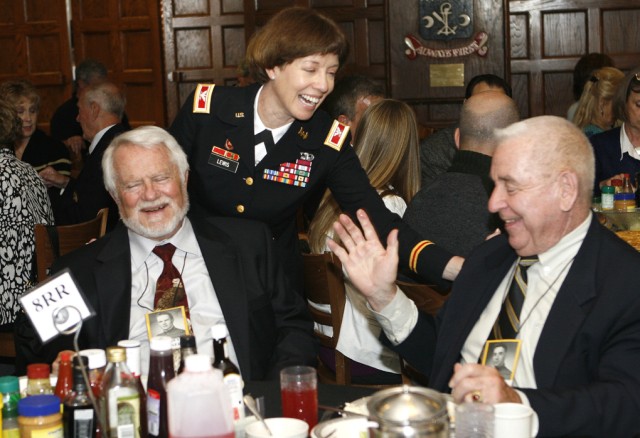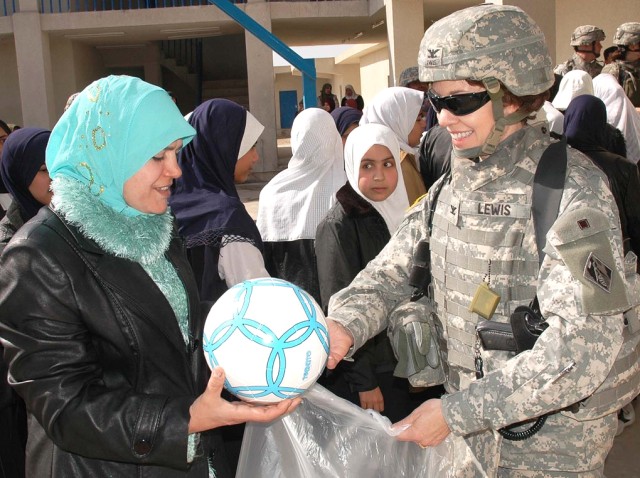WEST POINT, N.Y. (May 27, 2010) -- For the first time in West Point history, two female cadets, from the Class of 2010, earned the highest honors bestowed upon a graduating class. This, the 212th West Point class, recognized Elizabeth Betterbed and Alexandra Rosenberg atop a class of 1,002 graduates, while President Barack Obama called out both individuals during his graduation address May 22.
"This underscores a fact that I've seen in the faces of our troops from Baghdad to Bagram-in the 21st century, our women in uniform play an indispensable role in our national defense. And time and again, they have proven themselves to be role models for our daughters and our sons-as students and as Soldiers and as leaders in the United States armed forces," Obama said.
Col. Debra Lewis knows something about firsts. A member of the first class of women to graduate the U.S. Military Academy at West Point, Lewis was also the first female U.S. Army Corps of Engineers district commander of Philadelphia and Seattle districts and the first woman to command a USACE district in Iraq in 2006.
Before Madonna became an icon, a group of women were breaking new ground at West Point when they became the first female cadets admitted into the prestigious military academy. One hundred and nineteen women started the journey in July 1976 and 62 graduated as members of the Class of 1980, changing 178 years of tradition at the once all-male academy.
Lewis returned May 20 for her retirement ceremony, reflecting on a 30-year Army career and those of her time at West Point. The significance of their presence at the academy wasn't fully comprehensible to her back then, Lewis said, but then again, it permeated every facet of their lives.
What sports would they play' How would they be tested physically' How will the barbers cut their hair and what uniform alterations would there be' One could only imagine the discussion and debate that transpired over the establishment of a hair length policy, let alone the nuances of footwear.
"Upon entry to West Point, men and women were issued combat boots and suede sneakers-no arch support-to run in," Lewis said. "That first summer, women suffered a high level of leg and foot injuries from running two-to-four miles each morning. While I was a high school athlete, my farthest distance running previously was 1 1/2 miles. Yet, I made every run that first summer ...determined to 'pass out' before I 'fell out.'"
Project 60A was created prior to their arrival, using volunteer high school girls to determine how women will react to their initial exposure to ruck marches, physical fitness and other exercises. Results showed that "women possess much higher levels of physical ability than previously thought or that literature or existing evidence has led people to believe," as reported in 1976 by Dr. James Peterson, Office of Physical Education and principle designer of the project, in a Pointer View article. "With the exception of feminists, most people were telling us that women couldn't hack it."
Results of this study showed women had low levels of upper-body strength, but possess extraordinarily high levels of lower-body strength. Lewis said expectations were low for them from the start, but the female cadets improved each subsequent year as a group.
"Today, many areas of research are proving that women have a distinct advantage as a group, such as handling G-forces and interpersonal skills," Lewis said.
Lewis said she grew up playing football with her brothers and was never discouraged by her father to try new things. A graduate of the Class of 1950 and a veteran of World War II, Korean War and Vietnam War, retired Lt. Gen. Bennett L. Lewis, and his wife Malvere, provided their daughter with the guidance and fortitude to enter West Point. But nothing could prepare her for the hostility and derision that would follow.
"My choice to attend West Point was the first time I was exposed to extremely harsh negative words or disrespectful responses from people who did not know me personally, reacting simply because they could see I was a woman in a cadet uniform," Lewis said. "Initially, every negative response hit me hard. In response, I developed a talent for finding productive ways to deal with such situations."
It was at the Cadet Mess, where Lewis found a reliable ally.
"I had some pretty low days and there were times when you just needed someone who believed in you and be kind to you," Lewis said. "I had this waiter, his name was Jorge Chavez, and he saw the situation and was mindful of what was going on. He used to bring desserts to my table ... a whole extra pie. He'd bring me an extra dessert for lunch and dinner every day for four years. When I graduated I gave him a cadet saber, engraved, with my deepest appreciation. We need to be kinder and pay attention to one another because it's the right thing to do. A single act of kindness can transform a person's life."
Lewis was the academy's first female captain of its highly successful intercollegiate equestrian team and was named the 1980 Academy Equestrian of the Year. On the topic of facing adversity, Lewis said it was good for her to learn how to persevere and develop empathy for others who faced similar hardships.
"I think I am a much better person for it and able to handle a much larger range of situations successfully, while helping others do the same," Lewis said. "Cadet Tianyi Xin (Class of 2011) once wrote that 'West Point is a crucible that molds us into leaders of character.' I could not agree more."
Lt. Gen. Kathleen Gainey, Director for Logistics, J4, The Joint Staff, described Lewis as a bound and determined woman.
"Anybody who knows Debra, knows she is a determined woman," Gainey said. "That class would never have made it through if they weren't determined women and did not have the fortitude to stick up for what is right."
Gainey saw Lewis in action, commanding the central district in Iraq for the Corps of Engineers. Lewis was responsible for reconstruction missions within Baghdad and Al Anbar Provinces, and during her one-year command there, the district managed a program valued at more than $3 billion.
"I can tell you what a tough job that was because I got a chance to see firsthand the challenges she had and how she took them on, head first, and really made a difference," Gainey said.
Lewis also served as a West Point instructor in the Department of Systems Engineering. Her last assignment before retirement was as inspector general for Washington State's National Guard.
She plans to travel to all 50 states with her husband, retired Lt. Col. Doug Adams, as they embark on a yearlong "Duty, Honor, America Tour" to recognize and commemorate the sacrifice and selfless service of American Soldiers and their Families, past and present. In addition, they will help explore with other organizations and individuals methods to provide support.
With the Class of 2010 graduated and a new class about to begin, Lewis offered advice to both the new officers leaving and the cadets arriving next month.
"I now realize we are all leaders and our most important job is to bring out the absolute best in those around us, especially ourselves," Lewis said."I am convinced the Class of 2010 is far better prepared and talented than we were. They need to be. The only other advice to cadets I would give is to recommend they keep a copy of the Cadet Prayer handy to review periodically and as a compass for dealing with adversity and any tough days ahead of them. I've found it very inspiring and validating."




Social Sharing